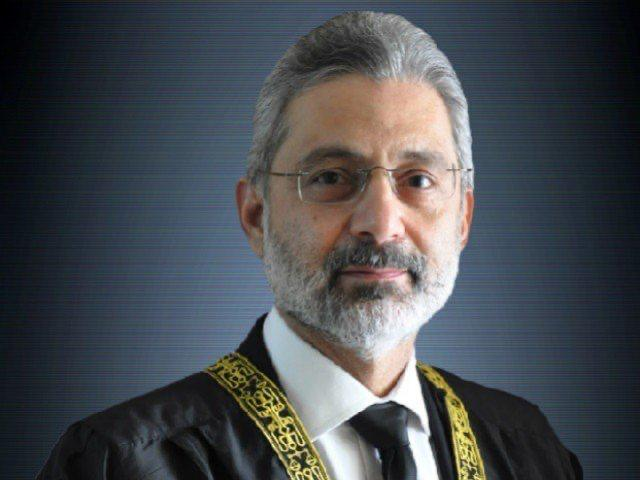Justice Isa questions talks with terrorists in Swat
SC judge says on whose request are we negotiating with terrorists who attack girls' schools

Supreme Court Senior Puisne Judge Justice Qazi Faez Isa on Saturday raised questions over the negotiations between the state and the Tehreek-e-Taliban Pakistan (TTP), asking who had authorised them and noted that the banned outfit had caused much loss to the nation.
"We are negotiating with terrorists. Who is doing it and what is being offered? What will we say [to TTP]… please bomb five schools and not six or please get some money or [we will] give you some weapons. What is on the negotiating table? Where are these negotiations being held and who has authorised them?" Justice Isa asked during his speech on the second day of the ninth International Judicial Conference.
He referred to the Global Terrorism Data report which revealed that 1,000 attacks had taken place on an educational institution in Pakistan.
Referring to a case about a school he had adjudicated last year, Justice Isa said the only girls' educational institution in Swat with over 1,000 students was bombed by terrorists and remained closed for nearly five years due to militancy in the district.
The Supreme Court judge also expressed concerns over the climate-induced disasters and suggested that instead of providing cars to the government officials, efforts should be made to launch bus service, fix pavements and improve cycle tracks, which would save import bill, cut global warming gases and make the environment healthy.
On a query about the judiciary’s alleged coordination with the GHQ directorate on legal research, Justice Isa quipped that he was not aware that the army had taken this task.
“However, I am more than ready to tender coordination as to how to operate tanks and artillery machines or if they want to learn the constitution or international law then they are welcome to invite me or anyone of us.”
Read more: Panic grips Swat after spurt in TTP activities
Later, Chief Justice of Pakistan (CJP) Umar Ata Bandial in his concluding speech stressed upon all the stakeholders to maintain a “balance”.
Justice is product of balance and entire the system is based on balance, he added.
The CJP emphasised the need for collective resolution of the stakeholders in the justice sector for the rule of law, democracy and respect for the Constitution to thrive in the country.
He noted that issues like increasing population, worsening climate change and pervasive gender inequality were hindering the effective administration of justice.
The Supreme Court is committed to protecting the marginalised [who are] directly affected but the legislature and executive must also do their bit, he added.
The CJP stressed the need for stakeholders in the criminal justice system, namely the police and prosecution, to improve their performance and coordination with each other in order to reduce the incidents of crimes.
Members of the judiciary and legal community were also urged to make efforts to enhance their capacity, legal knowledge and performance.
Various organs of the state were also prompted to ensure the involvement of women, who form 50% of the population, in the decision-making processes.
The CJP also emphasised that efforts should be made to effectively eradicate gender-based violence, along with other formal and informal biases that women face, both in the workplace and at home.
The need to counter problems relating to population growth and climate change on a priority basis was also stressed.
Also read: Swat situation under control, Senate panel told
The chief justice placed much emphasis on the need for all stakeholders in the justice sector to come together to improve the quality of justice dispensed by the courts. He encouraged the use of training sessions for the police and prosecution to increase conviction rates and reduce crime.
The chief justice also suggested that district judges partake in training sessions to learn about amendments and developments in the law and recommended that performance audits be made mandatory at all levels of the judiciary to assess gaps in legal knowledge.
Bar councils and associations were also urged to take a more proactive role in enhancing the legal knowledge of the advocates.
Former Sindh High Court Bar Association (SHCBA) president Salahuddin Ahmed expressed distress over the Supreme Court jurisprudence “which veered towards arrogating to itself the power to read words into the Constitution in order to effect what it perceives as the true will and intent of the constitution-makers”.
“On that note, may I add a personal note of distress here. Of late, the jurisprudence of this Court has veered towards arrogating to itself the power to read words into the Constitution in order to effect what it perceives as the true will and intent of the constitution-makers. I refer to the Aam Log Party v Election Commission case and the Presidential Reference in relation to counting votes of defectors. This is a dangerous path, sir,” he said.
“There is a frightening passage in Henry the VIth where Shakespeare writes – ‘Burn all the records of the realm. My mouth shall be the parliament of England,’” he said.



















COMMENTS
Comments are moderated and generally will be posted if they are on-topic and not abusive.
For more information, please see our Comments FAQ